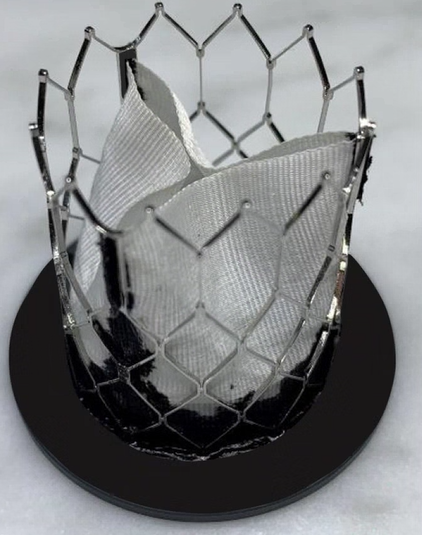Summary
- Profile Type
- Technology offer
- POD Reference
- TODE20250603007
- Term of Validity
- 4 June 2025 - 4 June 2026
- Company's Country
- Germany
- Type of partnership
- Research and development cooperation agreement
- Investment agreement
- Commercial agreement with technical assistance
- Targeted Countries
- All countries
Contact the EEN partner nearest to you for more information.
Find my local partner
General information
- Short Summary
- A German university has developed a new type of heart valve prosthesis for implantation in the human or animal body. The invention is designed to replace the animal heart valve leaflets and pericardial tissue on biological heart valves and can be used in surgically insertable valves as well as TAVI valves, whose implantation is minimally invasive. The university offers a license agreement or a technological cooperation agreement.
- Full Description
-
Medical advances in recent decades have extended human lifespan with no deterioration of quality of life. Much of this quality of life improvement has been due to artificial replacement materials and the parts made from them that can temporarily or permanently perform the functions of body parts that are not performing as they should.
A German university now developed a new heart valve prosthesis for implant into human or animal bodies. The valve prosthesis consists of a valve stent with a ring-shaped lower valve base and three fabric valve leaflets. Unlike current heart valve leaflets made of animal tissue, fabric leaflets allow high-precision, standardized, quality-assured manufacture and are also much less expensive. The polymer thread fabric provides the valve leaflet’s basic biomechanical structure and can be used for heart and venous valves. One of the two fabric edges forms the valve leaflet edge, with the other edge connected to the valve ring. The woven warp threads run parallel to the free leaflet edge; weft threads run perpendicular. The warp threads thus bear the maximum tensile forces upon valve closure, which is decisive for fatigue strength. In the area of the top commissures, they are configured specifically to bear load. The opposite edge of the woven fabric can be formed as a complete fabric edge or separated from the woven material in the form of a valve leaflet attachment with the separated edges sealed in post-processing (welding, bonding, etc.) to keep the weave from fraying. The valve leaflet’s woven structure can be layered by means of a spraying process or a polymer solution with electrospinning to improve blood compatibility and support endothelial cell colonization.
Initial prototypes have been successfully created and submitted to endurance testing (200 million stress cycles).
The university offers interested companies the opportunity to license and refine the technology in collaboration with the inventors. The technology can also be researched as part of a project in which companies can actively participate. This applies to companies in the medical technology, human medicine and biomechanics sectors. - Advantages and Innovations
- Heart valve prostheses are suitable for implantation into human or animal bodies. The invention is designed to replace the animal heart valve leaflets and pericardial tissue on biological heart valves and can be used in surgically insertable valves as well as TAVI valves, whose implantation is minimally invasive.
- Stage of Development
- Available for demonstration
- Sustainable Development Goals
- Goal 3: Good Health and Well-being
- IPR status
- IPR applied but not yet granted
- IPR notes
- The technology has been registered with the German Patent and Trade Mark Office. Based on the PCT application, further international patent applications in Europe (EP), the U.S. (US), and India (IN) have been submitted.
Partner Sought
- Expected Role of a Partner
- The university offers interested companies the opportunity to license and refine the technology in collaboration with the inventors. The technology can also be researched as part of a project in which companies can actively participate. This applies to companies in the medical technology, human medicine and biomechanics sectors.
- Type and Size of Partner
- SME <=10
- SME 11-49
- Big company
- SME 50 - 249
- Other
- Type of partnership
- Research and development cooperation agreement
- Investment agreement
- Commercial agreement with technical assistance
Dissemination
- Technology keywords
- 06001011 - Heart and blood circulation illnesses
- 06001013 - Medical Technology / Biomedical Engineering
- Market keywords
- 05003004 - Pacemakers and artificial organs
- 05003003 - Surgical implants
- Sector Groups Involved
- Health
- Targeted countries
- All countries
